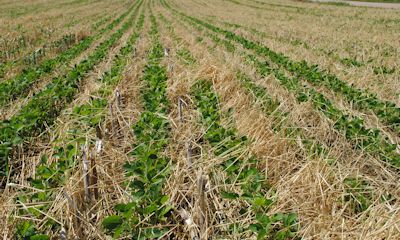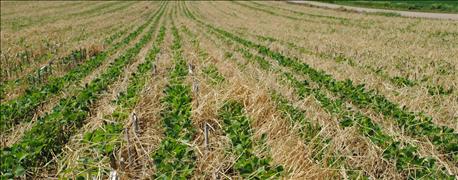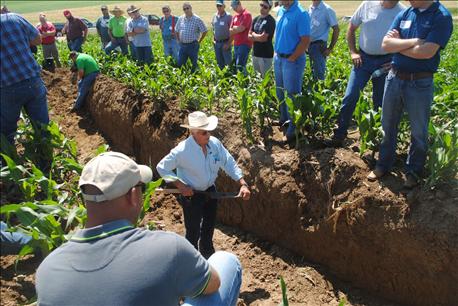

COVER CROP BENEFITS: Ward discussed how cover crops, as demonstrated in this soybean field planted into a cover crop, feed soil microbes a ration of what he calls "healthy stuff."
What do you get when you put Ward Laboratories, Inc. president, Ray Ward and his trusty spade in a field soil pit during a no-till field day? The answer is a wealth of soil health experience gained from decades of trial and error, in other words, "soil health gold." At a recent No-till on the Plains Whirlwind Expo stop at the Scott Heinemann farm south of Winside, Ward jumped into soil pits in no-till corn and soybean fields and a conventional tilled corn field to discuss what drives no-till production systems. Ward tackled several aspects of a good no-till system, including cover crops, companion crops, worms, organic matter and microbes. Here are a few gleanings of wisdom from Ward's time in the pits, discussing soil health and answering farmer questions.
Ward on worms. "Seeing worms and worm castings in the soil is how we know we are doing a good job."
Ward on cover crops. "The soil is hungry, so we need to feed it. We shouldn't be feeding it bad stuff. We need to feed it proteins, enzymes and other healthy stuff."
Ward on soil fertility and nutrients. "If you are taking anything off the land, you are taking nutrients with it. And we can't afford to let any of it wash away. Know your soil fertility. Follow that fertility and provide food for the microbes and food for the plants because they all work together."
Ward on doing chores. "When I was a kid, we milked cows by hand and had to do chores. Over the years, we've stopped doing chores on the farm. Well, it's time we got back to doing our chores and part of those chores is feeding the soil microbes, making our plants healthy, and reducing our input costs, especially now when grain prices are lower."

SOIL PIT WISDOM: "Seeing worms and worm castings in the soil is how we know we are doing a good job," says Ray Ward (in soil pit), president of Ward Laboratories.
Ward on soil health. "Diversifying our crops and crop rotations is going to make our soils healthier."
The no-till meeting also included a rain simulation demonstration by NRCS no-till specialist, Dan Gillespie and a no-till machinery discussion presented by Nebraska Extension engineer, Paul Jasa. An afternoon session included presentations by Heinemann, Keith Berns from Green Cover Seed, and Dan Stelling, a no-till producer from Pierce.
You can learn more about no-till systems by visiting No-till on the Plains online at notill.org. You can also contact Ray Ward at [email protected].
About the Author(s)
You May Also Like






